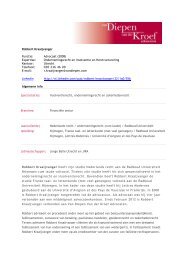Writ of summons - Van Diepen Van der Kroef
Writ of summons - Van Diepen Van der Kroef
Writ of summons - Van Diepen Van der Kroef
Create successful ePaper yourself
Turn your PDF publications into a flip-book with our unique Google optimized e-Paper software.
‘The conduct <strong>of</strong> an organ <strong>of</strong> a State (…) that is placed at the disposal <strong>of</strong> anotherinternational organization shall be consi<strong>der</strong>ed un<strong>der</strong> international law an act <strong>of</strong> thelatter organization if the organization exercises effective control over that conduct.’The Explanatory Memorandum <strong>of</strong> the ILC Commission to these articles shows thatArticle 5 applies in particular to peacekeeping forces <strong>of</strong> the UN. In that case the Stateproviding troops retains, for example, powers over disciplinary matters and the criminaljurisdiction (see, A/CN.4/L.654/Add.1, commentary article 5, page 11, number 1).350. The actions <strong>of</strong> peacekeeping forces are according to the ILC Articles accordinglyattributable to the UN, if the UN has exercised effective control over such peacekeepingforces. The UN assumes in principle that it exercises exclusive control (and thusnaturally also effective control) over its peacekeeping forces (see, the 2 nd ILC Reportover the ILC Articles for International Organisations, A/CN.4/L.654/Add.1, page 13,number (5)):‘The United Nations assumes that in principle it has exclusive control <strong>of</strong> the deployment<strong>of</strong> national contingents in a peacekeeping force.’351. The concept <strong>of</strong> ‘command and control’ is <strong>of</strong>ten used when authority over the troops <strong>of</strong>the UN is discussed in the literature. According to the NIOD Report and numerous othersources The Netherlands transferred command and control in principle to the UN. Therewas no written agreement. It was stated at numerous places that Dutchbat was un<strong>der</strong> thecommand and control <strong>of</strong> the UN. As far as the transfer was concerned the NIOD Reportstates on page 1189 et seq. that:‘The transfer <strong>of</strong> the operational control to the UN was usually set out in an agreementregarding transfer <strong>of</strong> authority. The State providing troops must in such case agree toevery change in the operational control. A government can in principle decideindependently to withdraw the unit without any consultation with the UN. What appliedin the case <strong>of</strong> Dutchbat, however, was that this battalion was placed at the disposal <strong>of</strong>the UN for UNPROFOR without conditions (…). Dutchbat was un<strong>der</strong> the operational© <strong>Van</strong> <strong>Diepen</strong> <strong>Van</strong> <strong>der</strong> <strong>Kroef</strong> Advocaten 2007www.vandiepen.com150
















